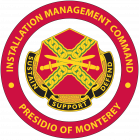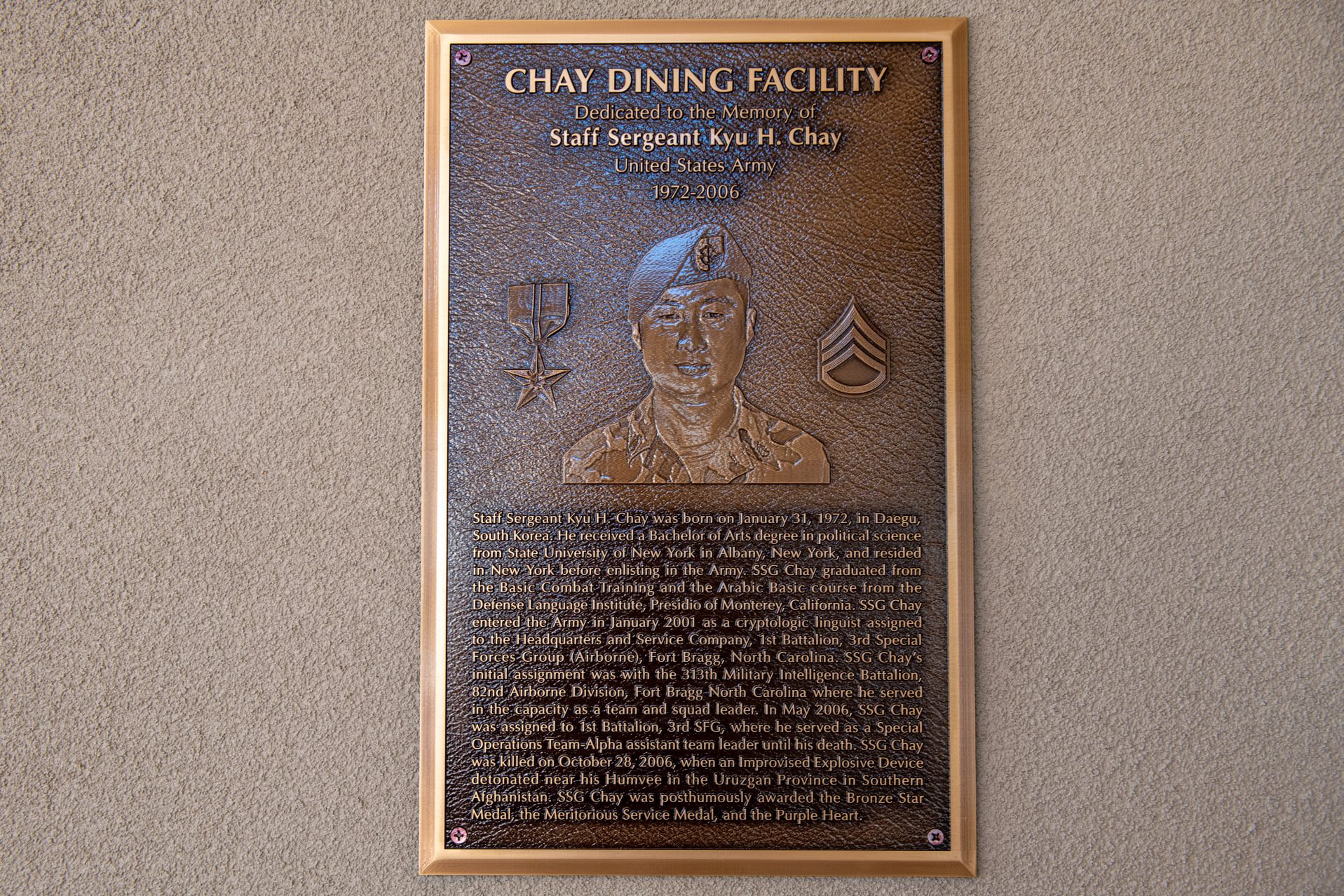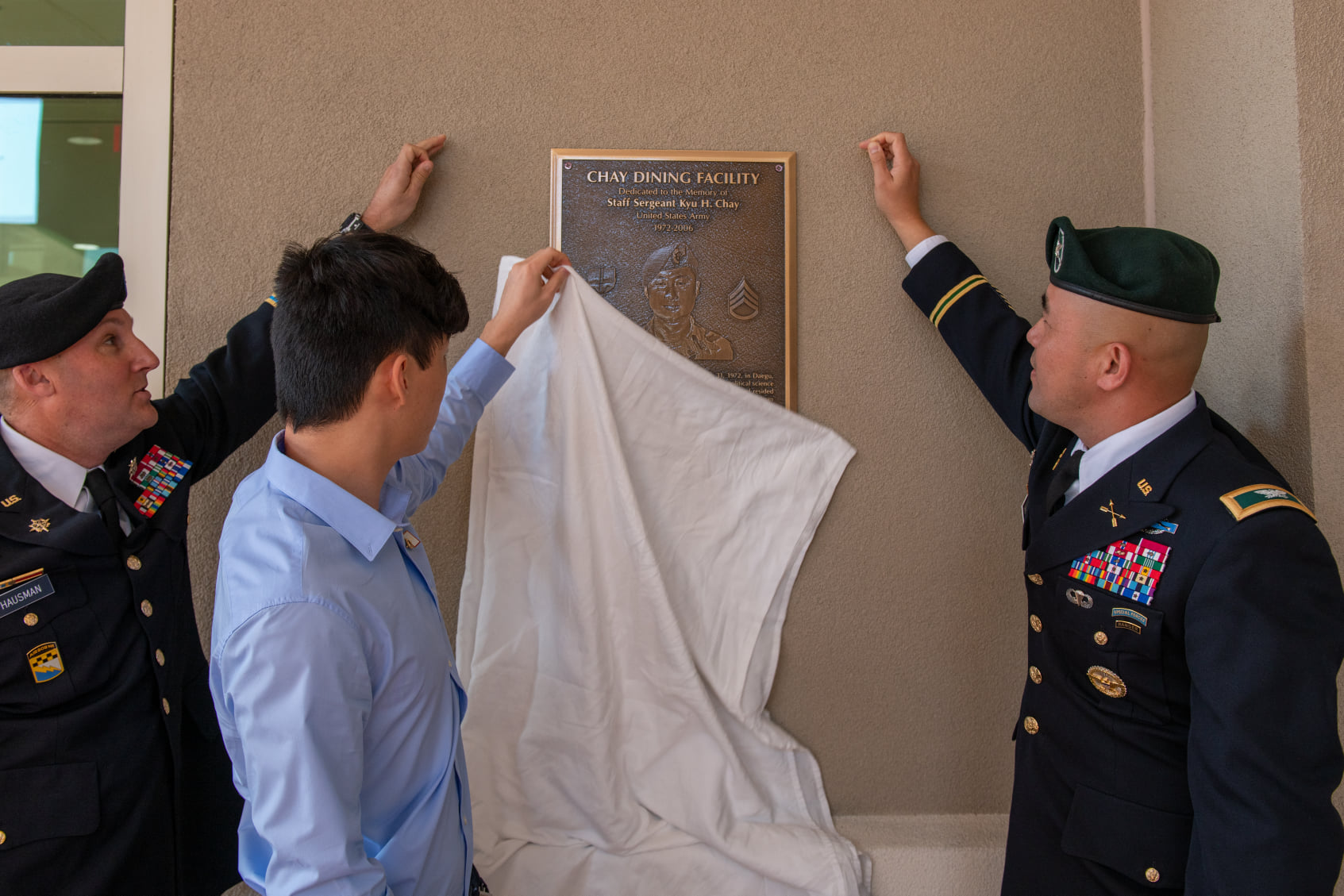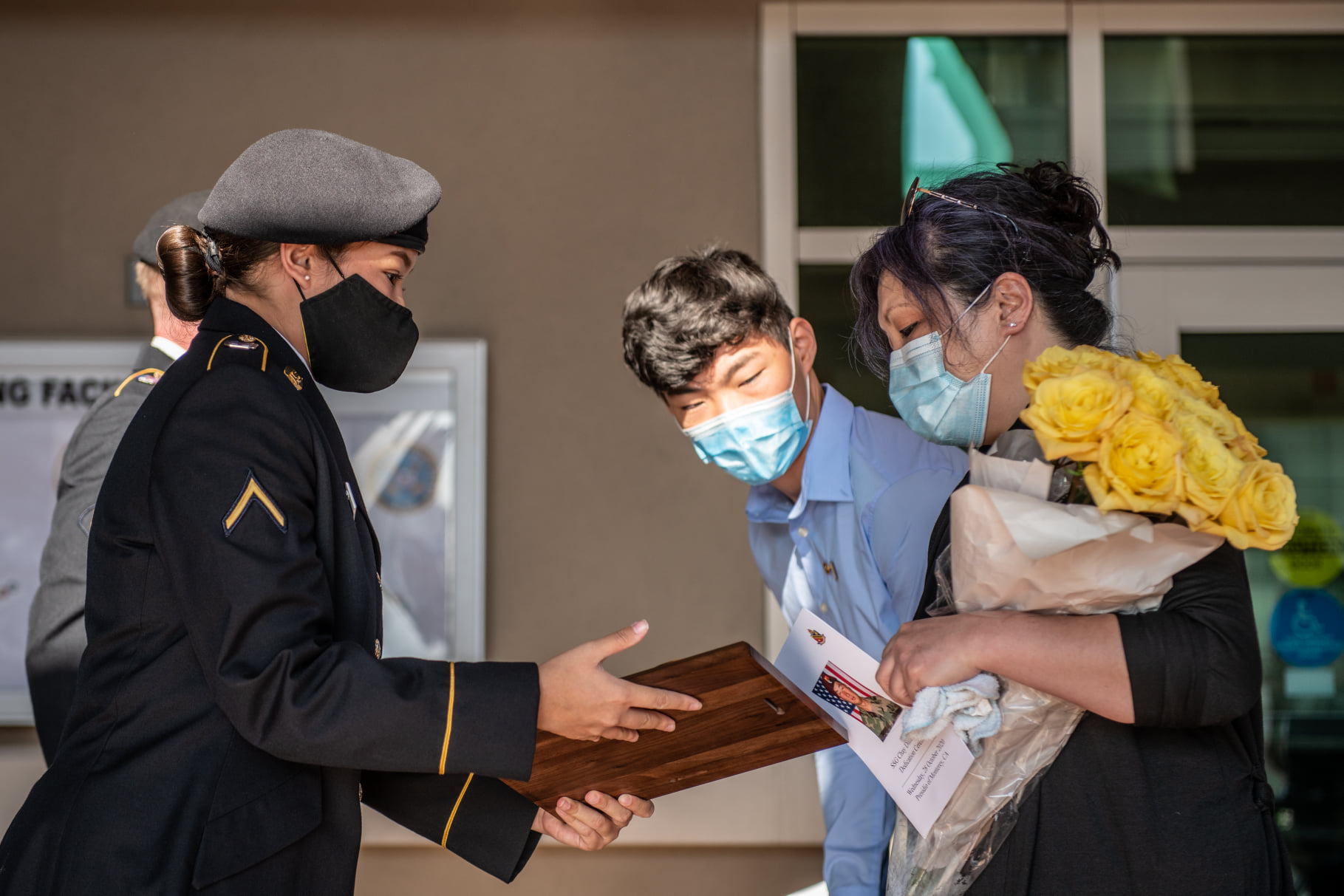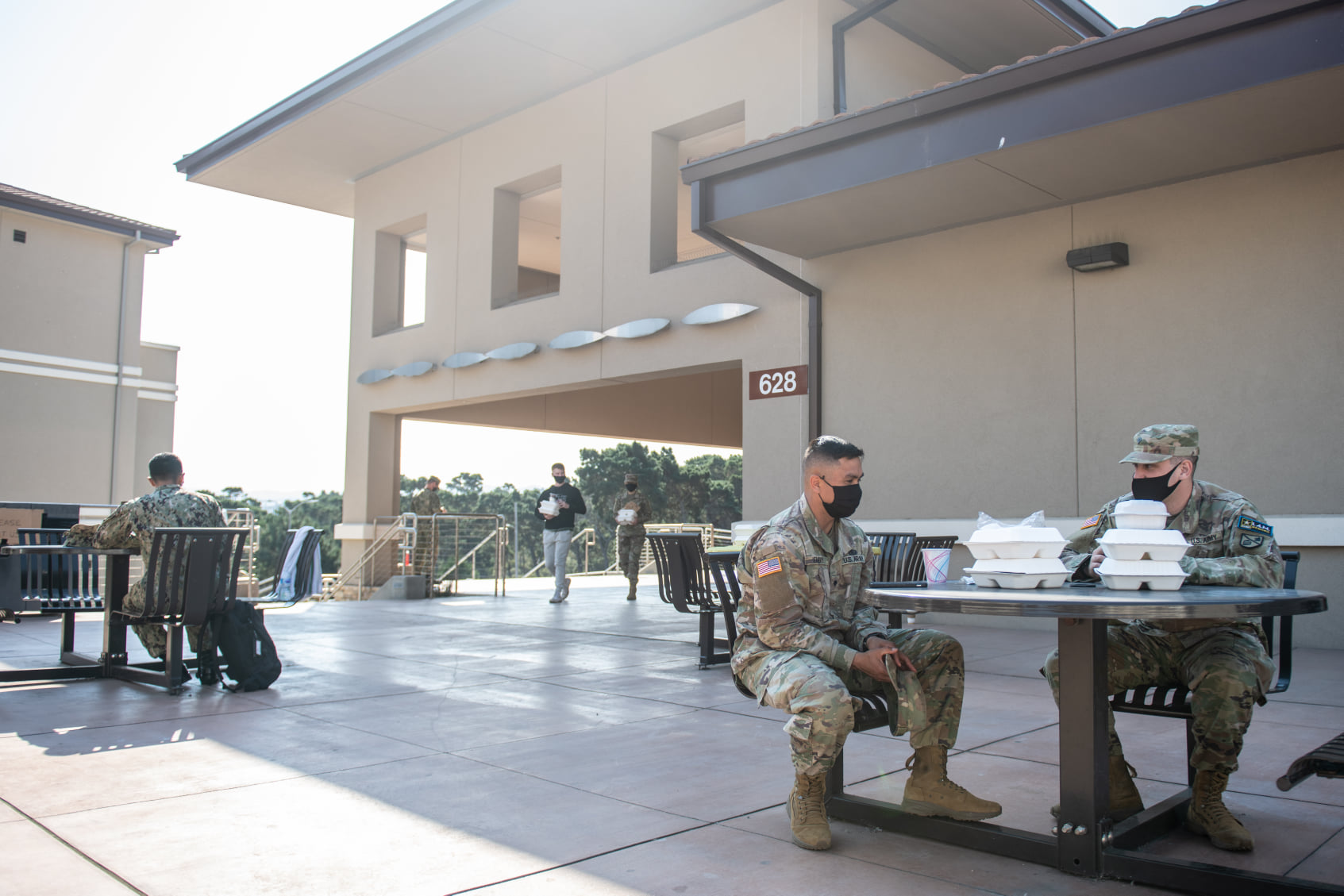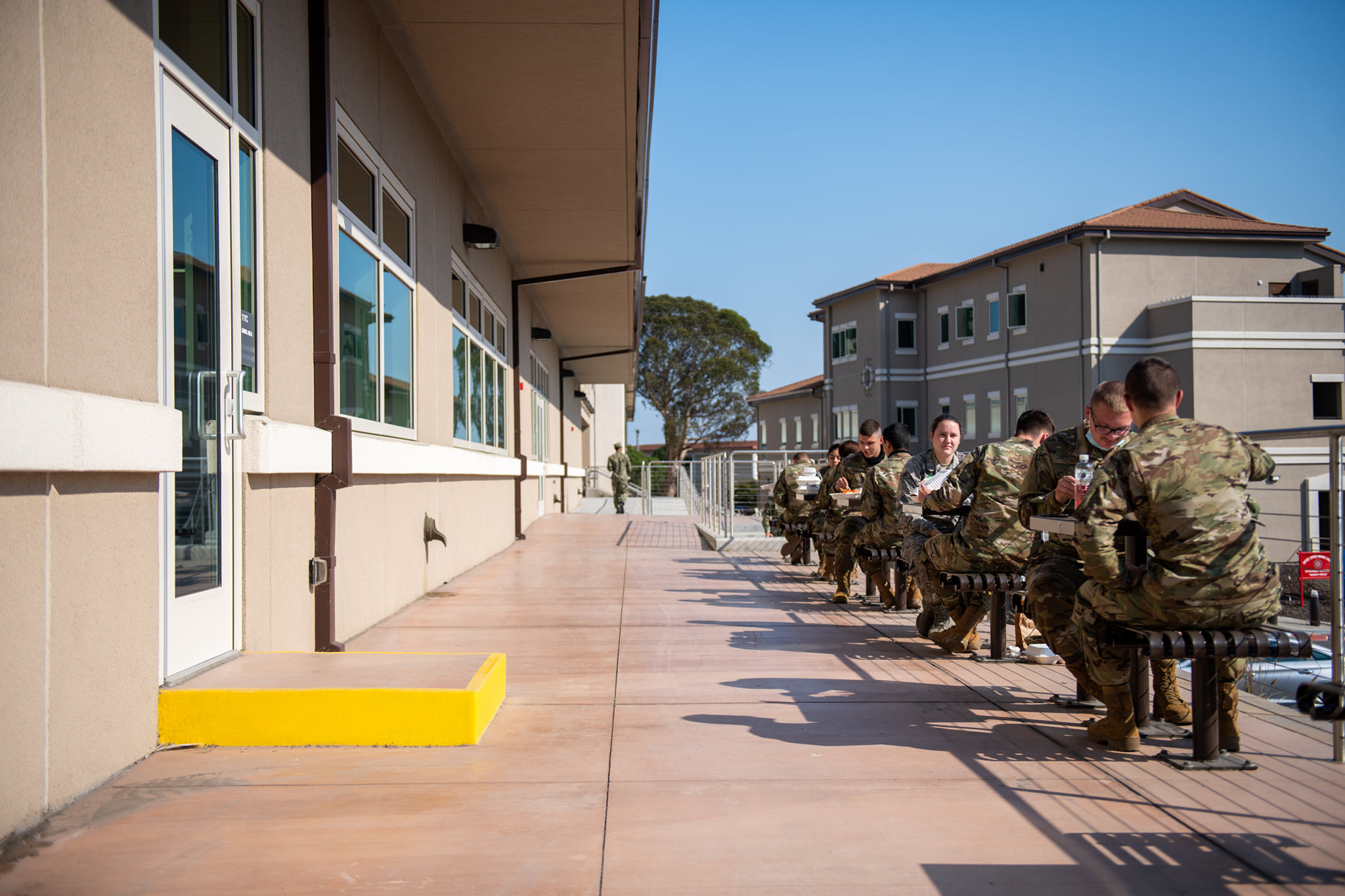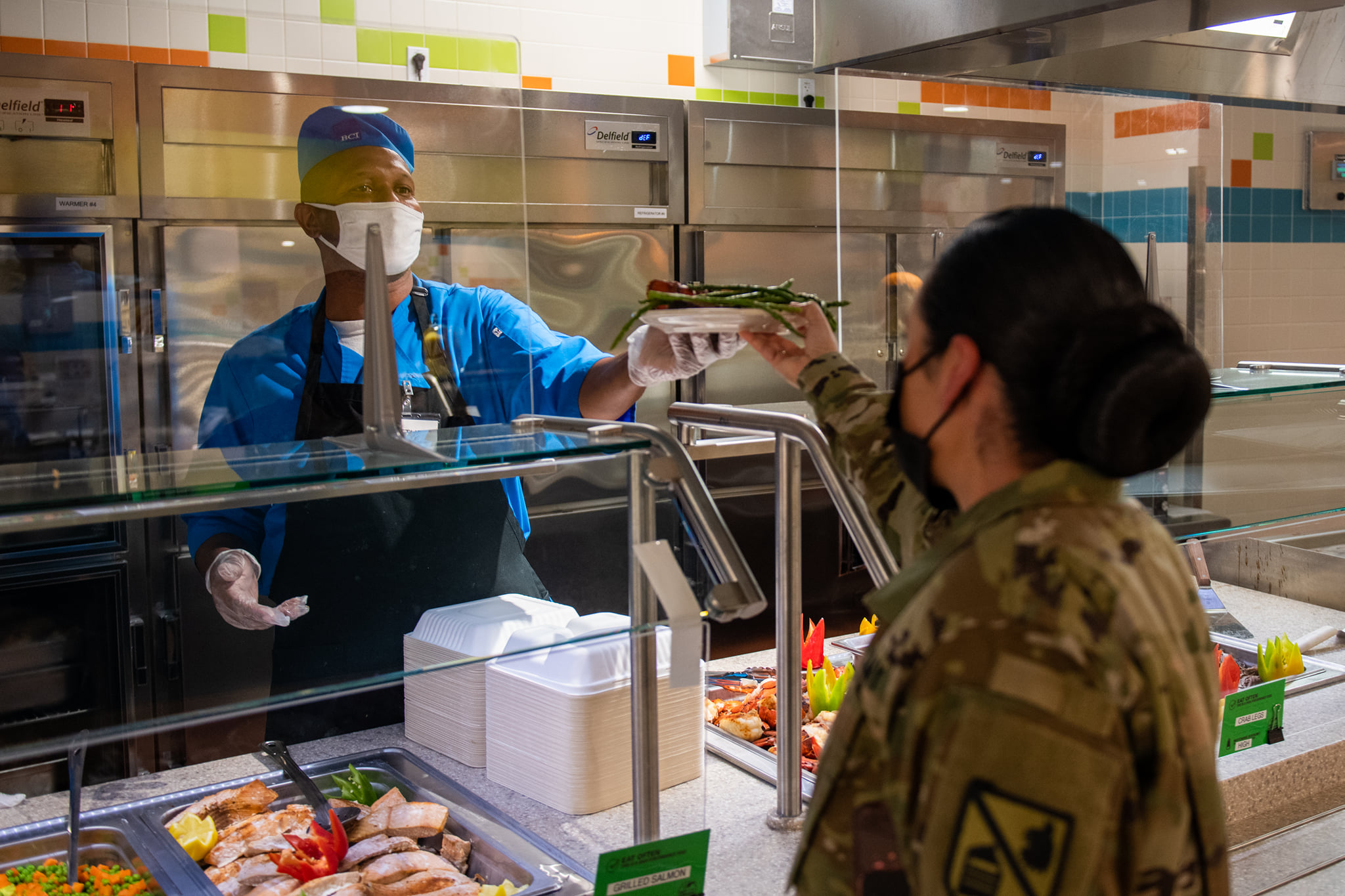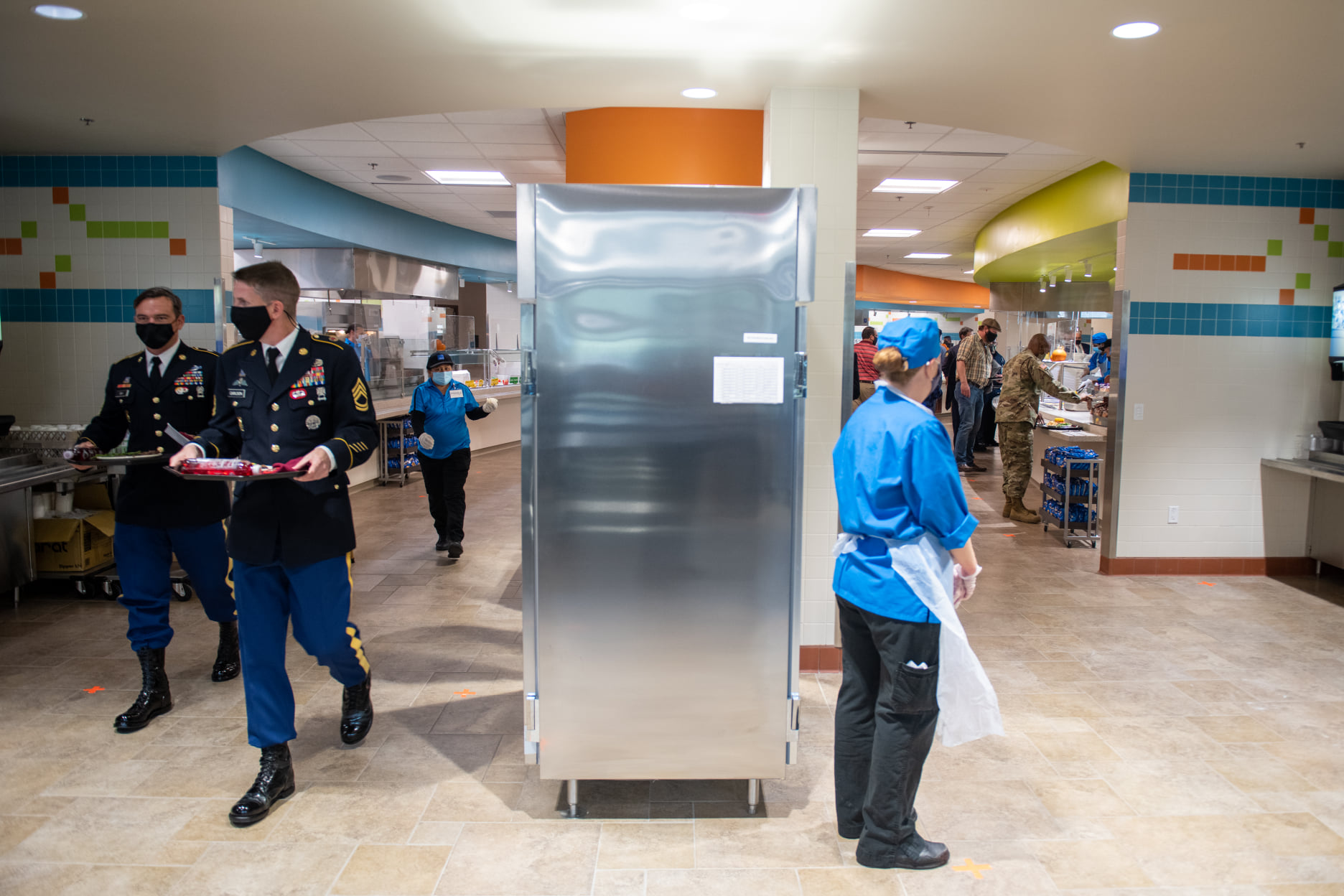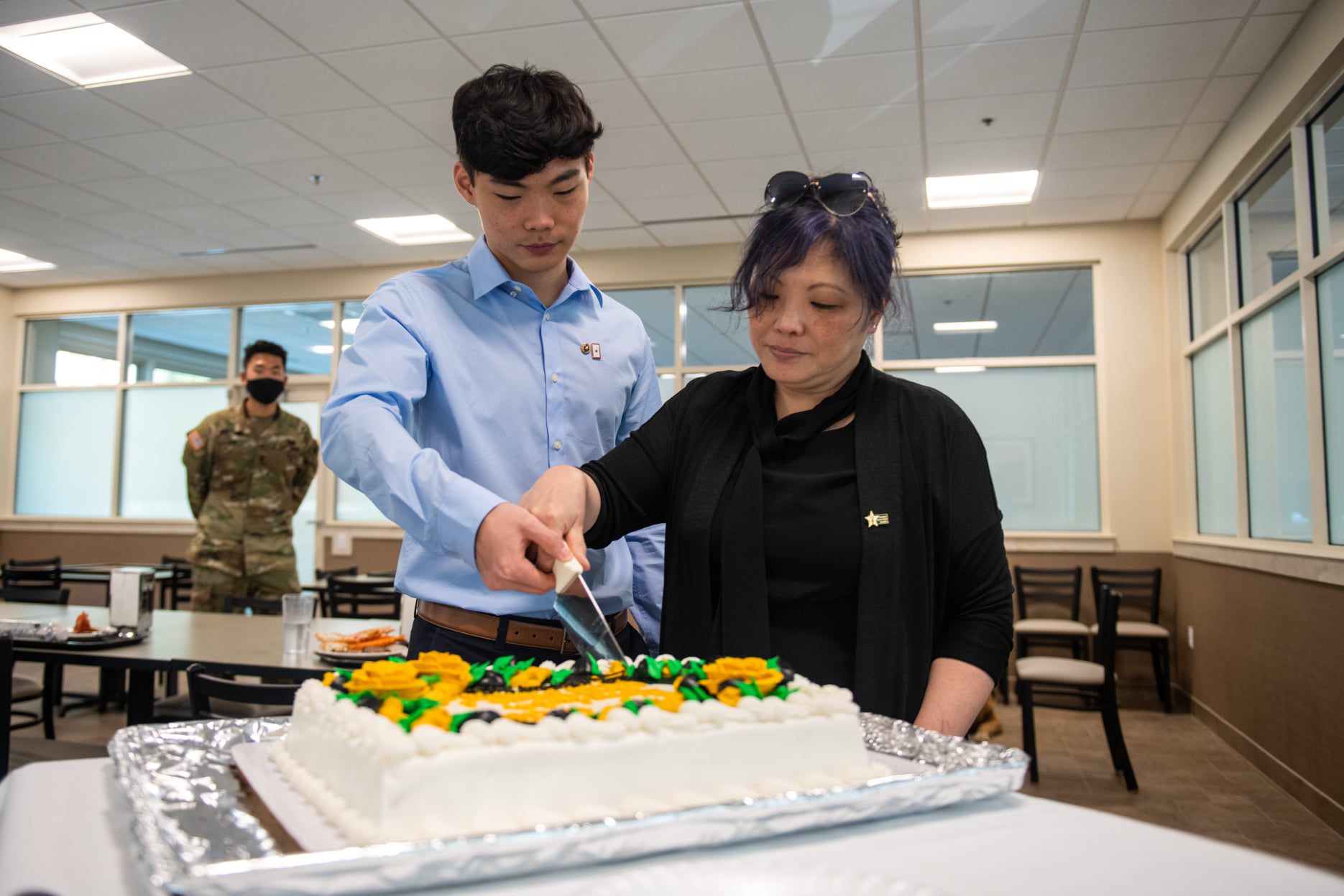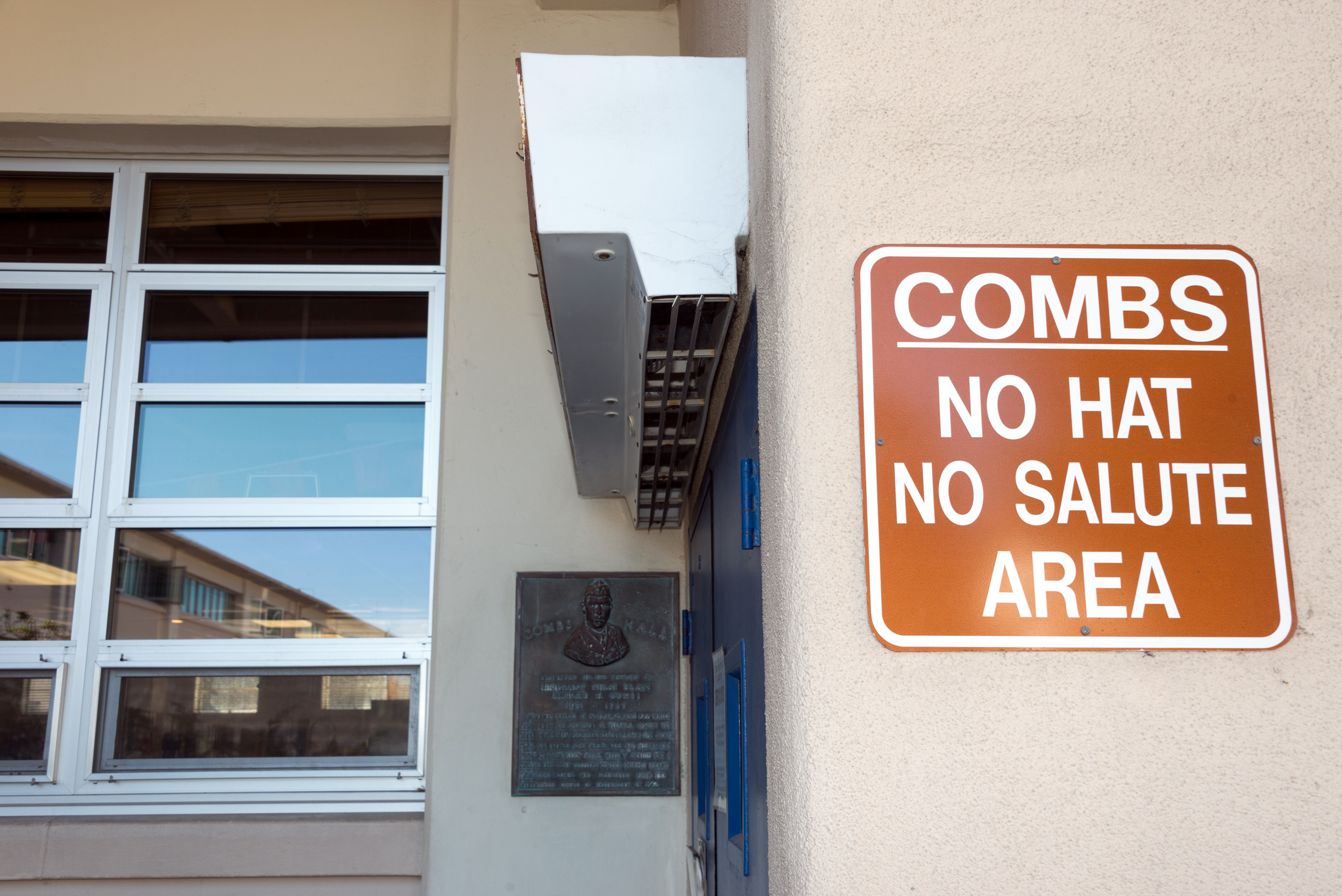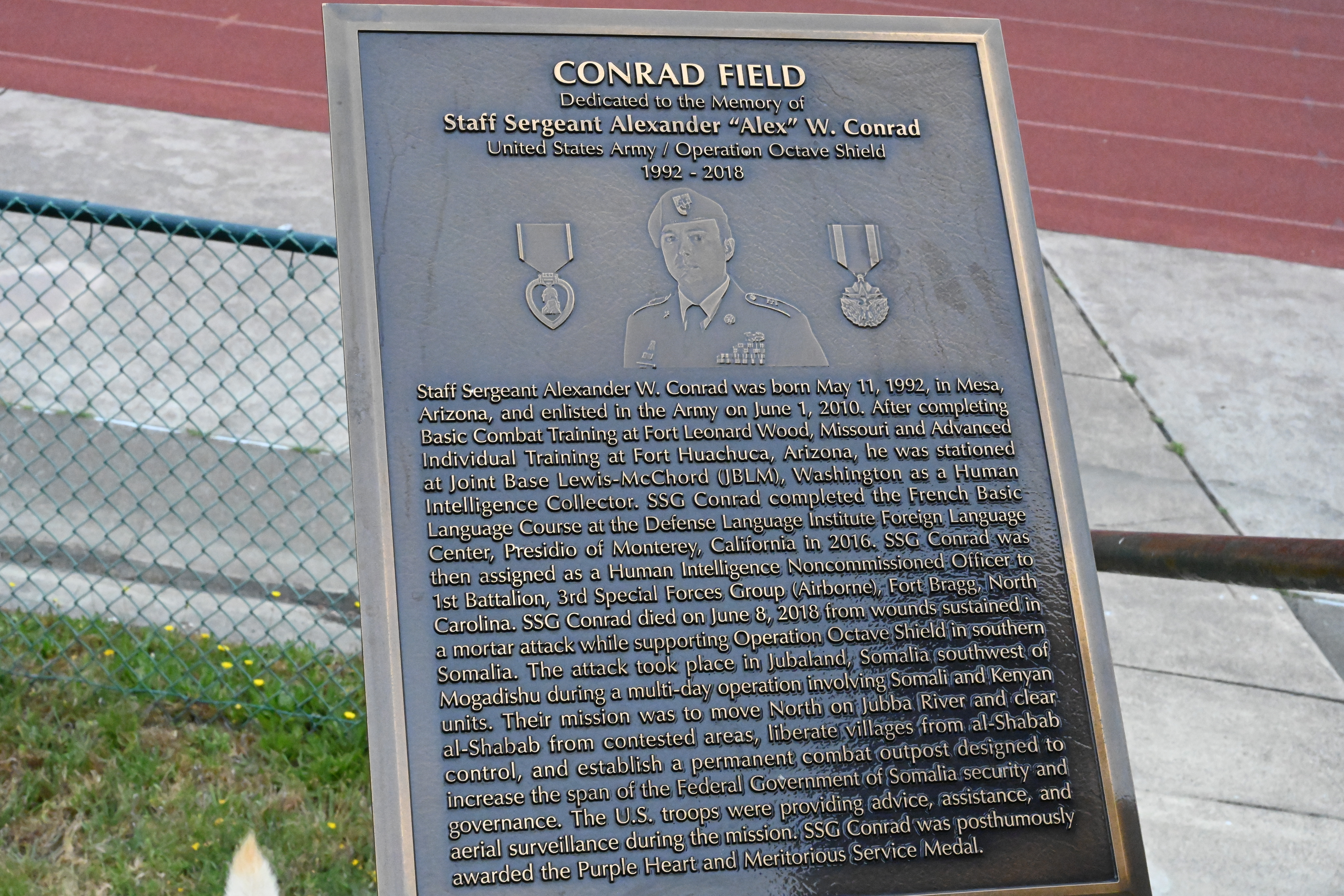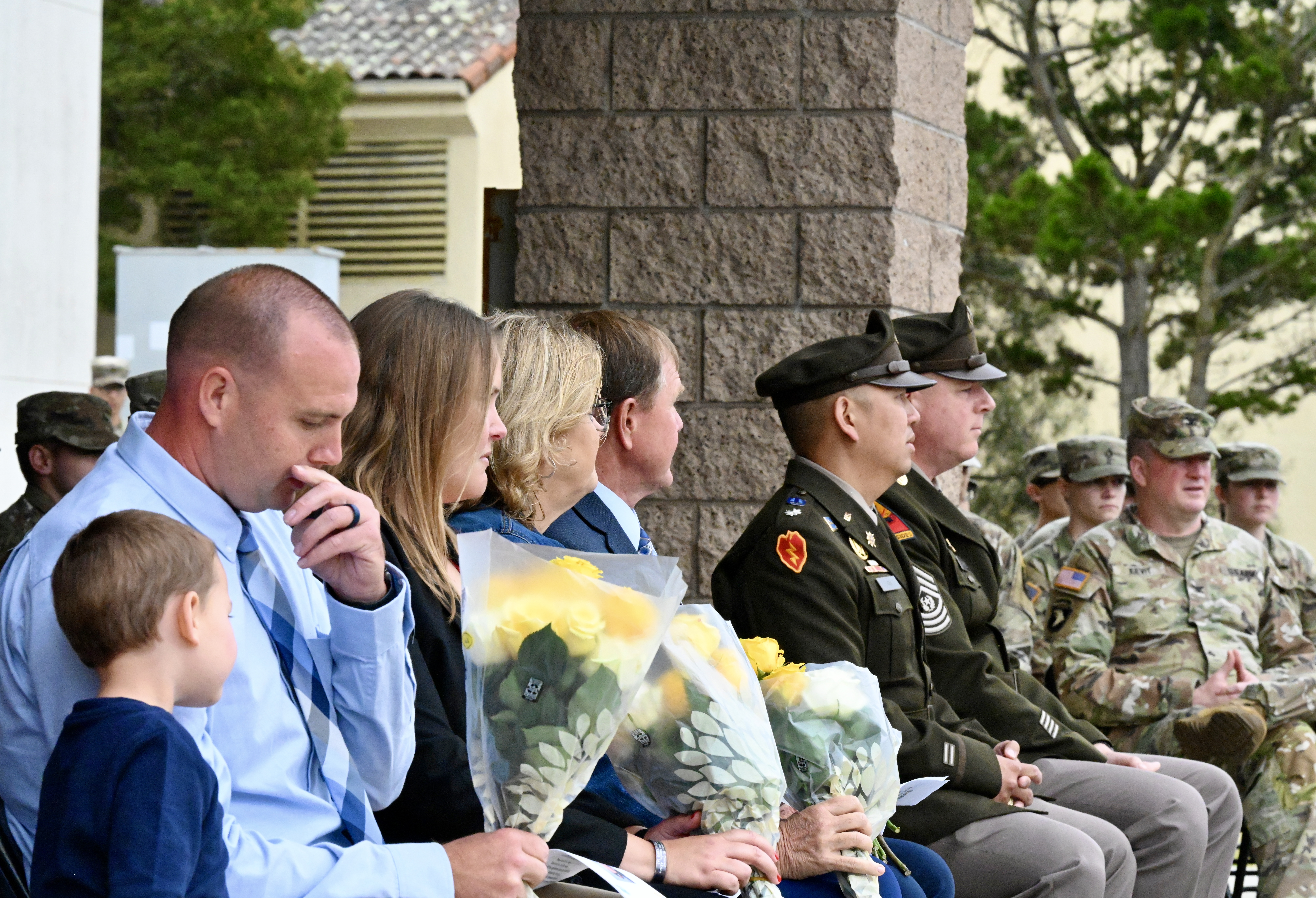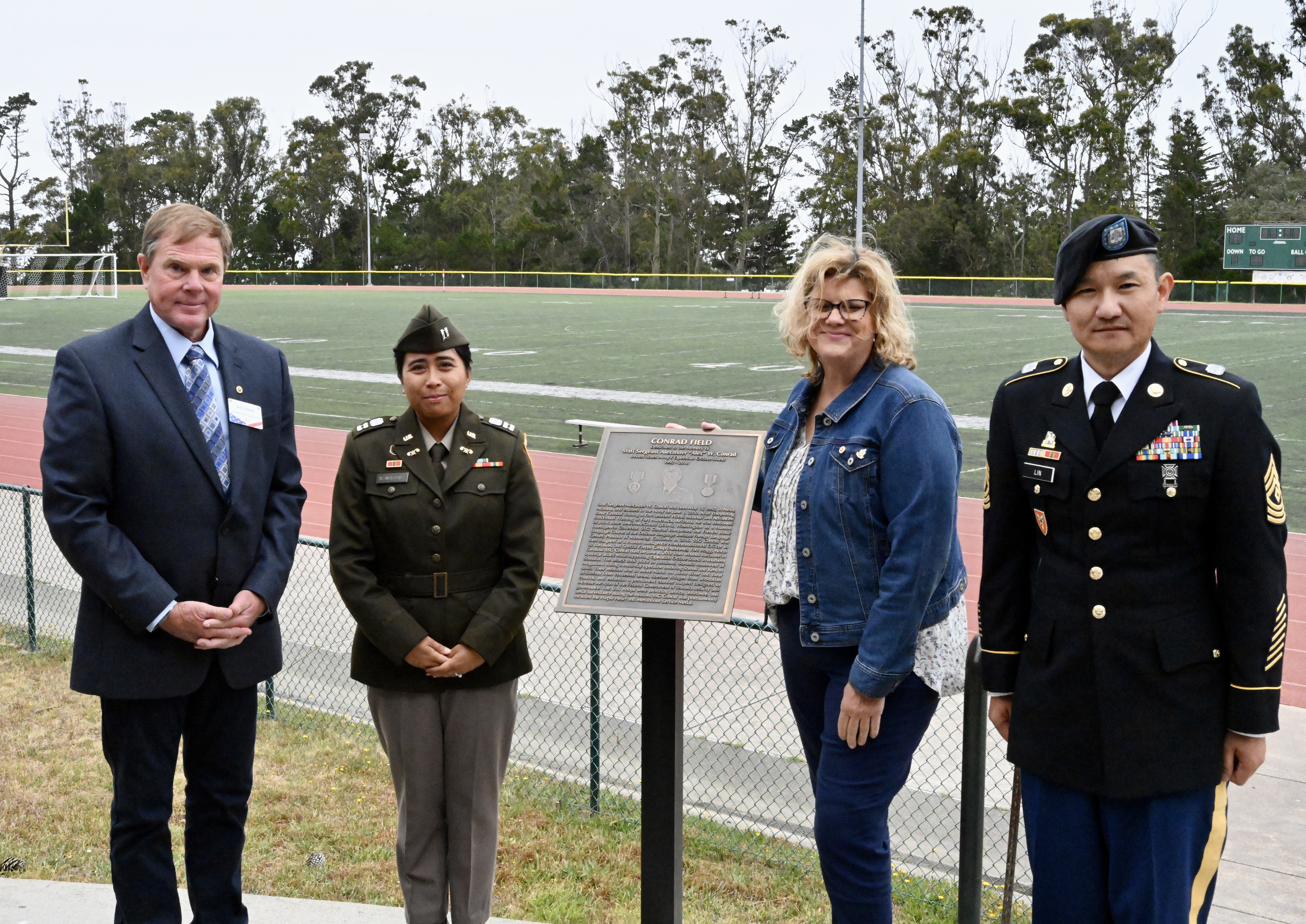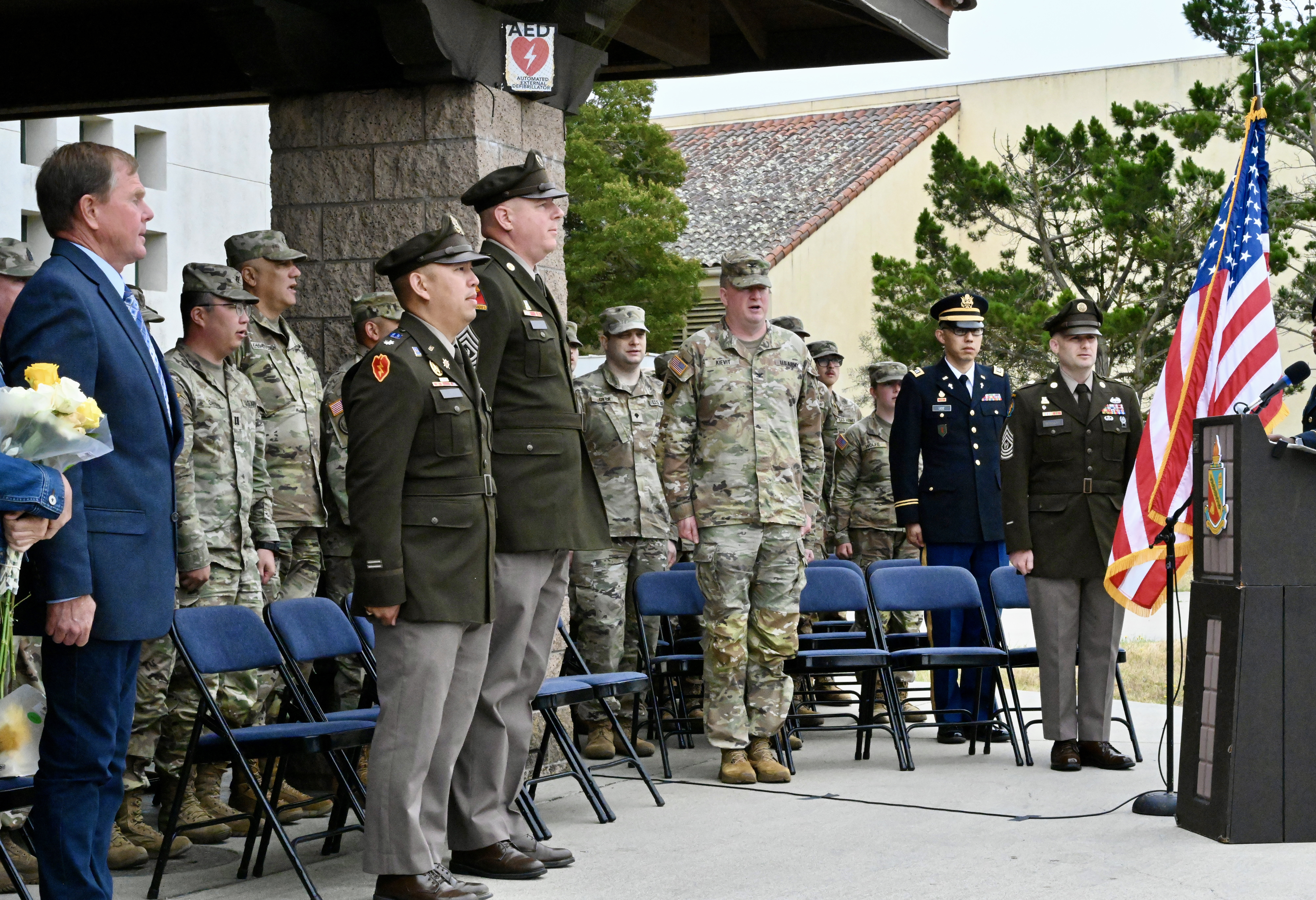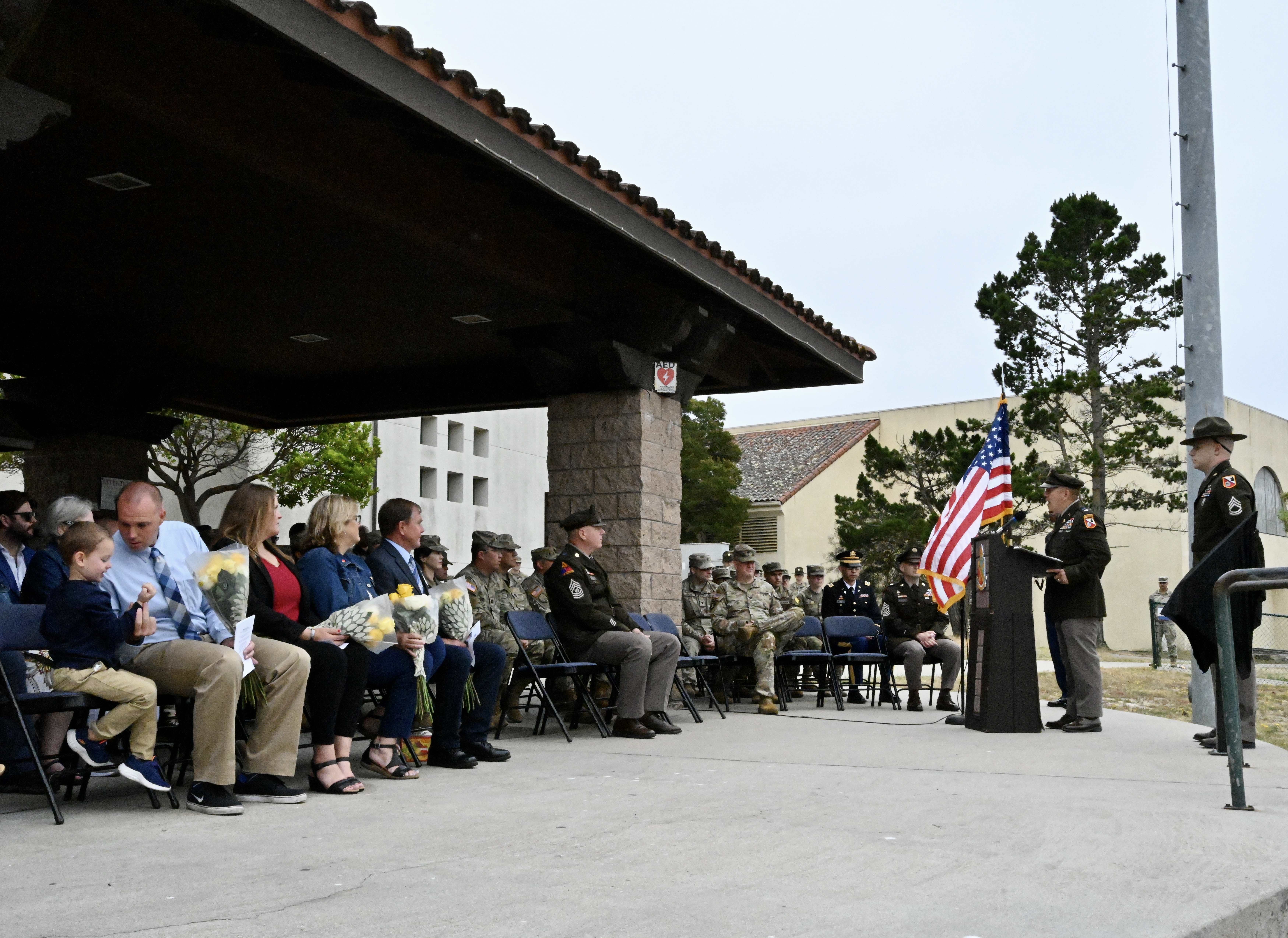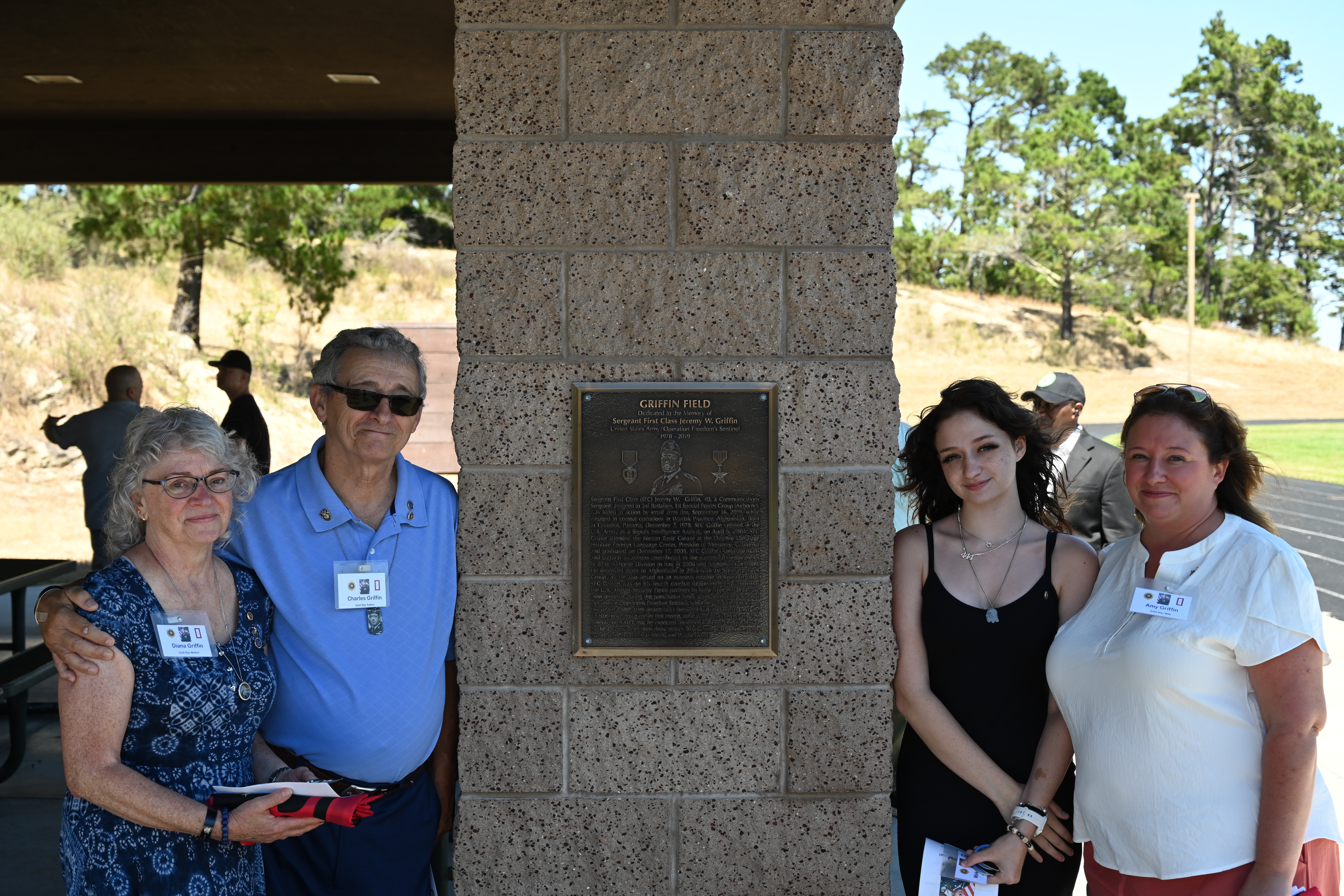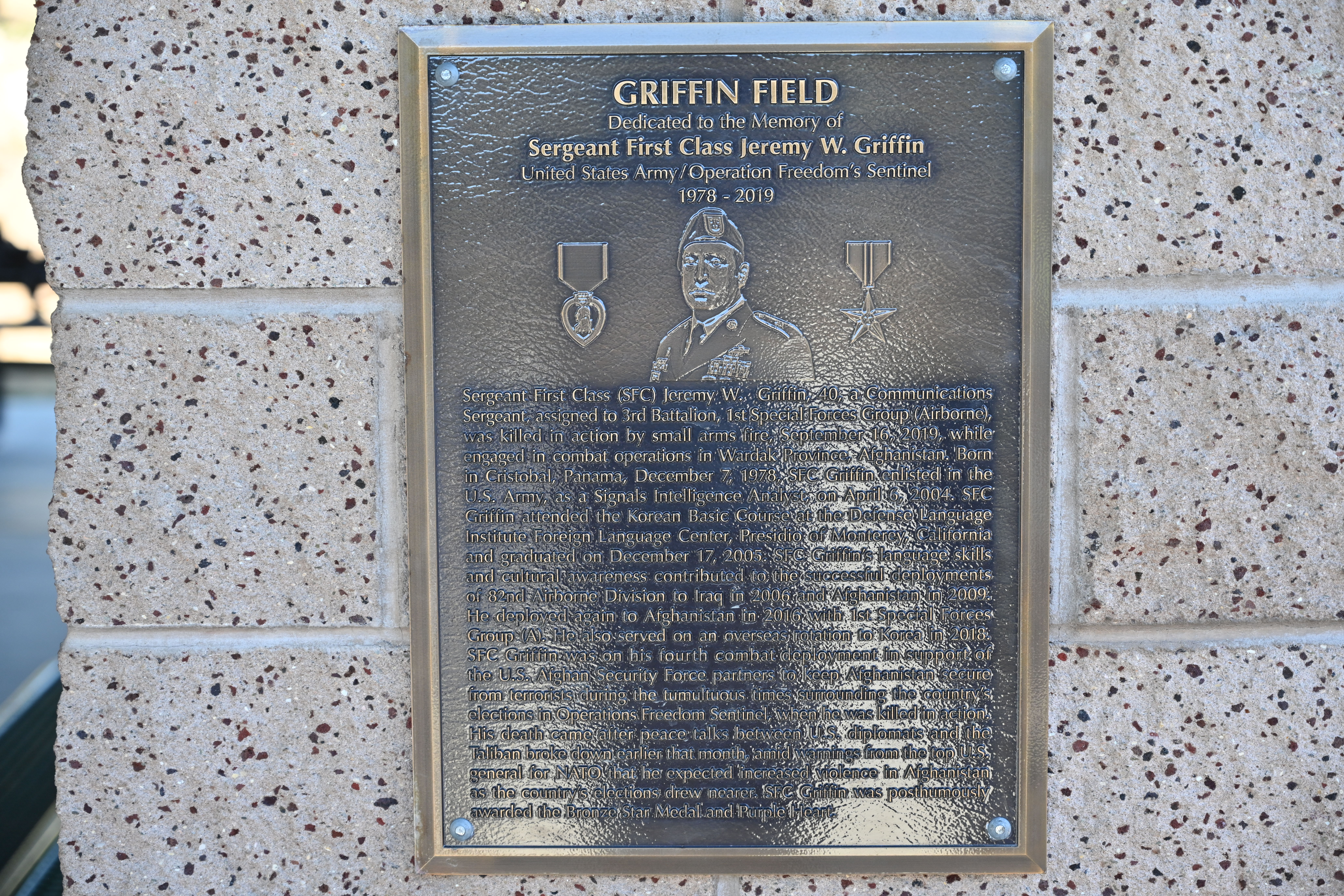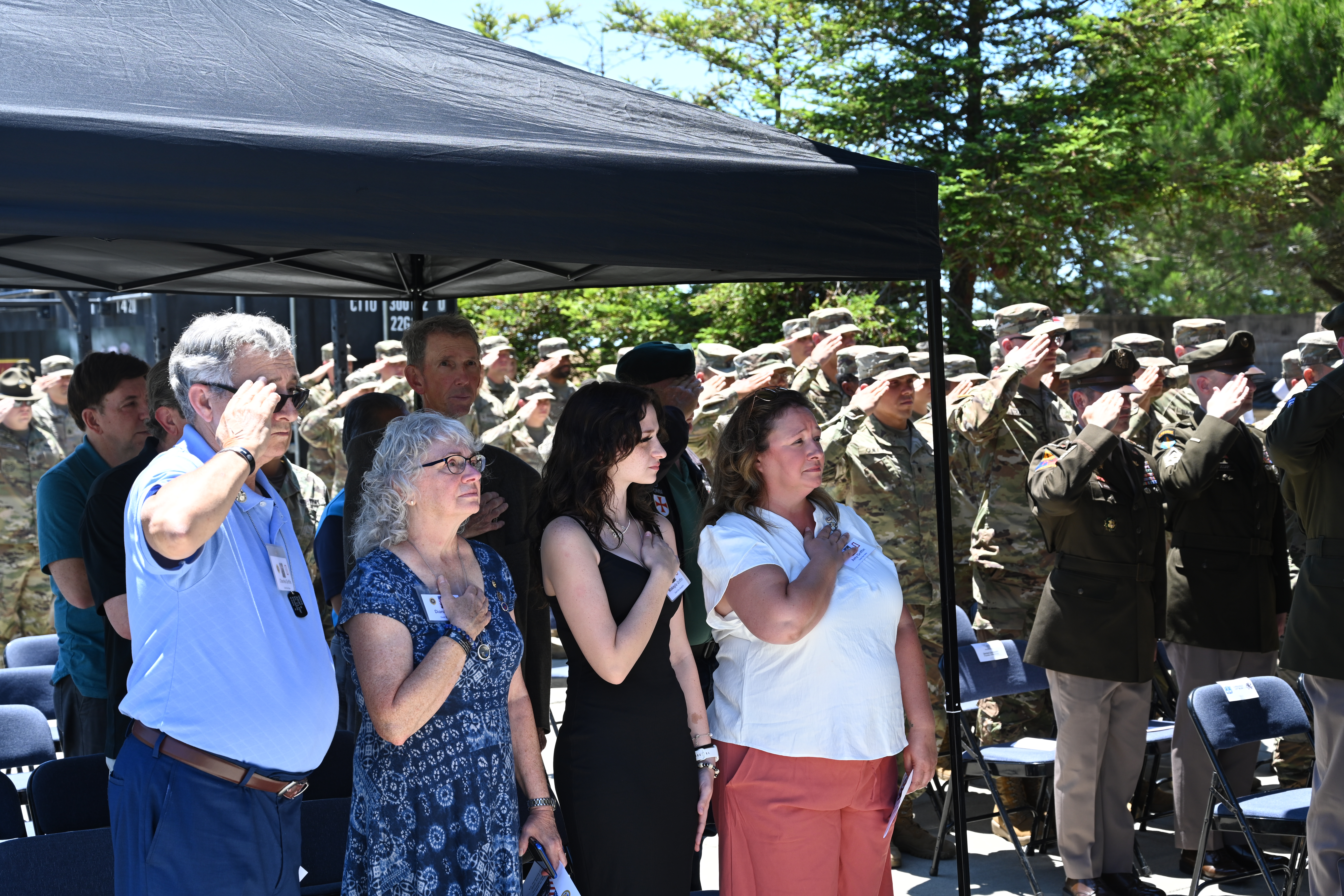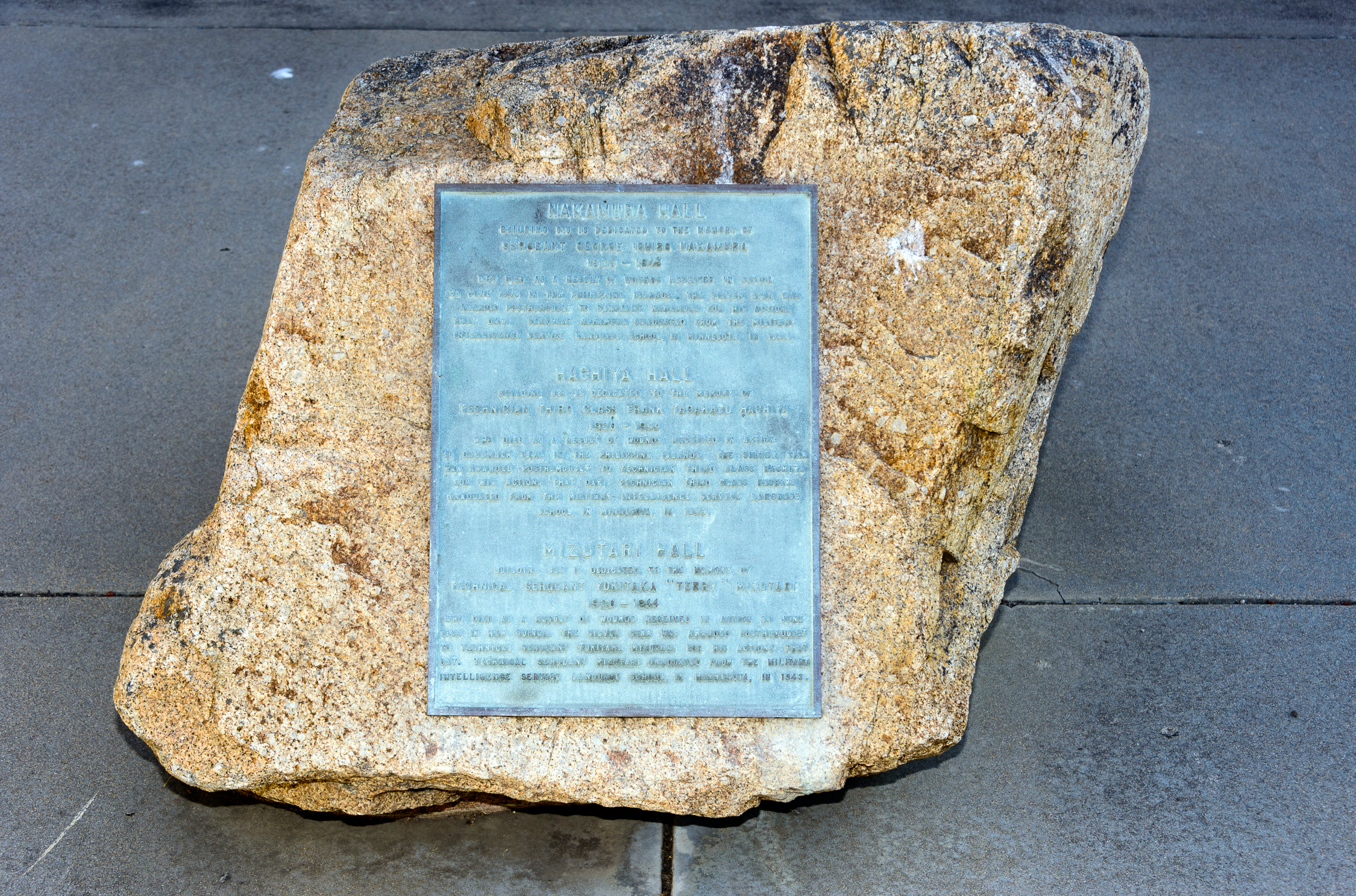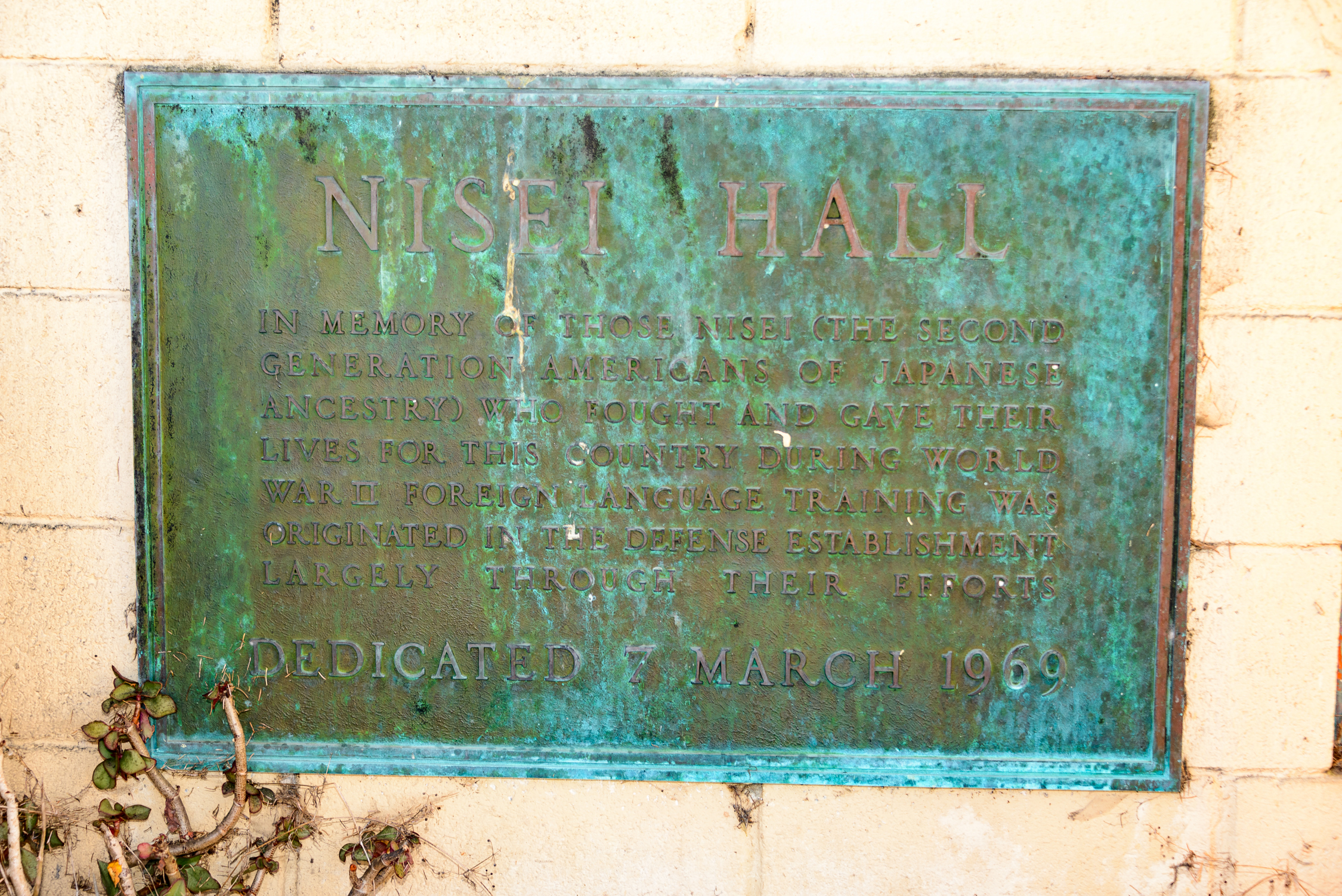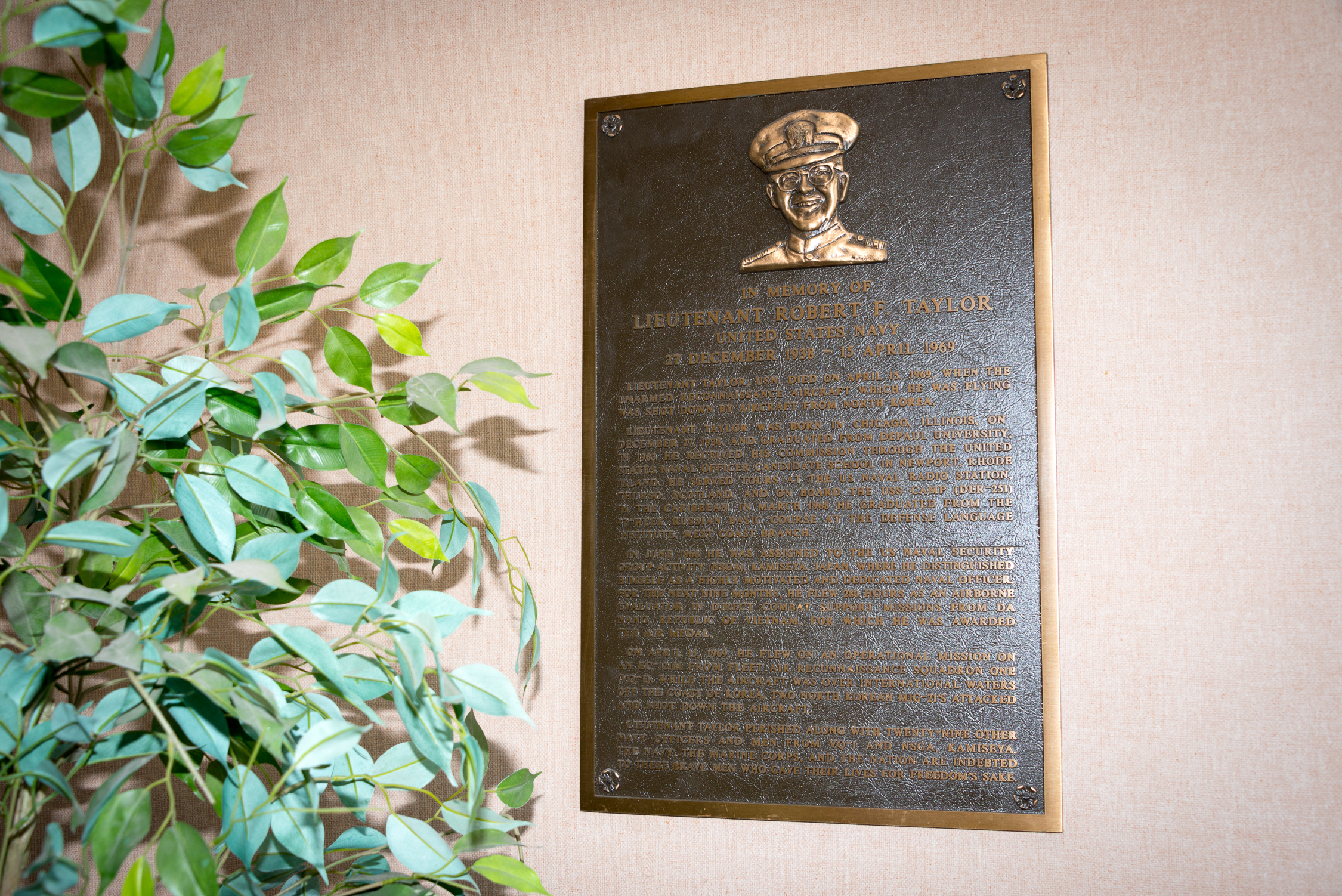Aiso Library - Building 617
John F. Aiso, 1909-1987, was a second-generation Japanese-American and Harvard Law School graduate who was called to serve his country during World War II. He was chosen to organize the Military Intelligence Service Language School (MISLS) where he served as director of academic training, 1941-45. Some of his students would go on to serve in the jungles of Guadalcanal, on MacArthur's intelligence staff and on the USS Missouri in 1945. After the war he resumed his practice of law and was the first Japanese-American to serve as California state judge.
Click here to see historic documents related to John F. Aiso
Barker Theatre (OMC) – Building 4230
PFC Charles H. Barker, 1935-1953, of Pickens County, SC was a soldier during the Korean War. He was killed in the battle of Pork Chop Hill in 1953 while serving with 7th Infantry Division in Korea. During a retreat he provided covering fire for his fellow soldiers until he ran out of ammunition. He was last seen engaging Chinese soldiers in hand-to-hand combat. He was posthumously awarded Medal of Honor for his actions.
Click here to see historic documents related to PFC Charles H. Barker
Belas Hall – Building 838
SGT Lee A. Belas, 1968-1991, was a graduate of the DLIFLC Russian basic course in 1989. He was also fluent in French, and had studied German, Flemish, and Latin. After graduating DLI he was given training in Arabic prior to being deployed to the Persian Gulf. He was killed in action 27 February 1991 during Desert Storm when his helicopter was shot down by Iraqi ground fire.
Click here to see historic documents related to SGT Lee A. Belas
Bomar Hall - Building 622
CPO Frank W. Bomar, USN, 1940-1970, enlisted in the Navy in 1959. He graduated from DLIWC Vietnamese course in 1967. While serving as a Navy SEAL in Vietnam he was killed in action in 1970. Throughout his service he was awarded a Navy Commendation Medal, the Silver Star, two Bronze Stars, and two Purple Hearts.
Click here to see historic documents related to CPO Frank W. Bomar
Chamberlin Library (OMC) - Building 4275
BG Harry Dwight Chamberlin, c1885-1944, graduated from West Point in 1910. He served in World War I and World War II before becoming commanding general, Fort Ord, 1943-1944.
Click here to see historic documents related to BG Harry Dwight Chamberlin
Chay Hall - Bldg 628
Kyu H. Chay was born on January 31, 1972 in Daegu, South Korea. He received a Bachelor of Arts degree in Political Science from State University of New York in Albany, New York, and attended Brooklyn School of Law before entering in the United States Army in 2001. SSG Chay graduated from Basic Combat Training at Fort Leonard Wood, Missouri and completed advance language studies in the Arabic language at the Defense Language Institute, Presidio of Monterey, California.
In May 2006, SSG Chay was assigned to 1st Battalion, 3rd Special Forces Group (Airborne), where he served as a special operation Team-Alpha assistant team leader until his death. SSG Chay was killed on October 28, 2006, when an Improvised Explosive Device detonated near his vehicle in the Uruzgan province in Southern Afghanistan. SSG Chay was posthumously awarded the Bronze Star Medal, the Meritorious Service Medal, and the Purple Heart. SSG Chay was laid to rest with full honors at Arlington National Cemetery on October 28, 2006, and added to the National Security Agency’s Wall on October 28, 2006.
Collins Hall - Building 611
BG James Lawton Collins, Jr., 1917-2002, served as Commandant of the Army Language School from 1959-1962, then became the first Director of the Defense Language Institute when language education was consolidated in 1963. He was an accomplished linguist, proficient in French, Italian, German, Spanish, and learned some Russian during intelligence assignments.
Click here to see historic documents related to BG James Lawton Collins
Combs Hall - Building 627
SFC Alfred H. Combs, 1931-1965, was from Seaside, CA and graduated from DLIWC Vietnamese course in 1964. He was killed in action by a ground explosion in Vietnam. He was awarded the Silver Star, Bronze Star and Purple Heart.
Click here to see historic documents related to SFC Alfred H. Combs
Conrad Field
Army Staff Sgt. Alexander W. Conrad. Conrad was born on May 11, 1992, in Mesa, Arizona and completed the French Basic Language Course at the DLIFLC in 2016. Conrad died on June 8, 2018, from wounds sustained in a mortar attack while supporting Operation Octave Shield in Southern Somalia. The attack took place in Jubaland, Somalia, southwest of Mogadishu, during a multi-day operation involving Somali and Kenyan units.
Click here to read more about Staff Sgt. Conrad and the memorialization ceremony at PoM.
Cook Hall - Building 613
Col. Donald G. Cook, 1934-1967, was sent to Vietnam in late 1964, where he served as an advisor to the Vietnamese Marine Division until he was wounded and captured by the Viet Cong several weeks later. He was the first Marine POW in Vietnam, held as a prisoner of war from December 31, 1964 until his death from malaria at age 33, in 1967. He was posthumously awarded Medal of Honor and promoted from Captain to Colonel.
Corpuz Hall - Building 607
CPL Bernard P. Corpuz, 1977-2006, joined the Army in 2004 and is a DLIFLC graduate of the Basic French Course. Upon mobilization in support of Operation Enduing Freedom, he served as an interrogator for the 232nd Military Intelligence Company at Bagram Airfield and at the Field Detention Site in Ghazni. He was killed in Afghanistan in 2006.
Click here to see historic documents related to CPL Bernard P. Corpuz
Gasiewicz Immersion Facility (OMC) - Building 4399
SGT Cari Anne Gasiewicz, 1976-2004, graduated from DLIFLC Basic Arabic Course in 2003. She was killed outside of Baghdad by two improvised explosive devices while traveling from Iraq to Kuwait.
Griffin Field
Sgt. 1st Class Jeremy W. Griffin, 1978-2019, graduated from Defense Language Institute Foreign Language Center's Korean Basic Language Course in 2005. Griffin was killed in action on September 16, 2019, by small arms fire during combat operations while supporting Operation Freedom's Sentinel in Wardak Province, Afghanistan.
Griffin, who was from Greenbrier, Tennessee, served as a special forces communications sergeant with 3rd Battalion, 1st Special Forces Group at Joint Base Lewis-McChord, Washington. Griffin was posthumously awarded the Bronze Star Medal and Purple Heart.
Hachiya Hall - Building 621
T/Sgt. Frank T. Hachiya, 1920-1945, served on Leyte Island in the Philippines during World War II, translating enemy documents and interrogating prisoners. When forward units detained a hostage, the young interpreter volunteered to cross a valley to question him. Moving ahead of his infantry patrol, Hachiya was shot at close range under confusing circumstances, either by a Japanese sniper or by friendly fire. Bleeding profusely, he retraced his steps across the valley to medics, who treated his wounds and sent him to a battlefield hospital, where he died in January 3, 1945.
Click here to see historic documents related to T/Sgt. Frank T. Hachiya
Hays Hospital [Formerly] (OMC) - Building 4385
MG Silas B. Hays, Medical Corps, 1902-1964, was commissioned in the Medical Reserve Corps in 1928, and was later assigned to active duty. He served during World War II in the Office of the Chief Surgeon in the European Theater. Hays was awarded the Legion of Merit with an Oak Leaf Cluster. In June 1945, the French Provisional Government awarded him the Croix de Guerre with Palm and in November 1945, named him an "Officer de l'Ordre de la Sante Publique." In 1950, he was named Surgeon of the U.S. Army in the Pacific, with station at Fort Shafter, Hawaii. In 1955, he was named Surgeon General of the U.S. Army until he left in 1959.
Click here to see historic documents related to MG Silas B. Hays
Hobson Recreation Center - Building 843
SSG Kenneth R. Hobson, 1971-1998, was one of the eight Americans killed in the terrorist explosion that tore through the United States Embassy in Nairobi, Kenya on August 7th, 1998. He graduated from the DLIFLC Arabic basic course in 1993.
Click here to see historic documents related to SGT Kenneth R. Hobson
Kendall Barracks - Building 629
Gunnery Sgt. George P. Kendall, Jr., 1930-1968, graduated from DLIWC Vietnamese course in 1967. During the Battle of Hue in Vietnam he volunteered to serve as Noncommissioned Officer in Charge of a reconnaissance/intelligence patrol. After securing vital intelligence information, the patrol leader and another Marine deployed to search the west side of Hue Stadium and immediately became pinned down by intense enemy semiautomatic weapons fire. Kendall, in an attempt to aid his besieged comrades, maneuvered around the east wall of the stadium and was wounded by enemy automatic weapons fire. With complete disregard for his own safety and his painful wound, he continued his advance but was wounded again by enemy fire. Undaunted, he continued his one-man assault on the enemy machine gun, silencing it before he succumbed to his wounds. He was posthumously awarded the Silver Star.
Click here to see historic documents related to Gunnery Sgt. George P. Kendall
Kent Navy Yard
SCPO Shannon Kent, 1983-2019, was a linguist fluent in Spanish, French, Portuguese and Arabic. While deployed to Syria she and three other Americans died when a suicide bomber detonated an IED in the Syrian city of Manbij. Kent and her team were part of a highly skilled, multi-disciplined task force hunting ISIS in the Levant.
Khalil Hall - Building 417
Alfie Khalil, 1947–2006, began as an Arabic instructor at the Defense Language Institute Foreign Language Center in 1979 and became the president of the American Federation of Government Employees from 1989. He was instrumental in establishing the Faculty Personnel System and fighting three attempts to close DLIFLC.
Lewis Hall - Building 228
PFC Robert E. Lewis, a DLIWC student in 1961, drowned while trying to rescue a fellow soldier drowning in Carmel Bay.
Click here to see historic documents related to PFC Robert E. Lewis
Mizutari Hall - Building 623
CPL Yukitaka Mizutari, 1920-1944, was a technical sergeant and head of the 6th Infantry Division language team at Maffin Bay, New Guinea. One night during the fierce Battle of Lone Tree Hill, Mizutari was killed by an enemy bullet while defending the division command post from attack. He earned a posthumous Silver Star, becoming the first MIS Nisei to be killed in action.
Click here to see historic documents related to CPL Yukitaka Mizutari
Munakata Hall - Building 610
Yutaka Munakata, 1911-1981, was one of the first four instructors at the Military Intelligence Service Language School starting in 1941 and served as an Army language instructor for 38 years. He retired as assistant dean.
Click here to see historic documents related to Yutaka Munakata
Munzer Hall - Building 618
Dr. Hans W. Munzer, 1916-1976, was a linguist who served in France during World War II. He served as a DLIFLC faculty member and administrator from 1952-1976.
Nakamura Hall - Building 619
SGT George I. Nakamura, 1919-1945 and his family were sent to the Japanese-American internment camp at Tule Lake during World War II. While in the internment camp in 1942, George Nakamura enlisted in the Army where he was sent to translator. He was assigned to the Philippine Islands to translate and negotiate with Japanese soldiers and prisoners. On June 29, 1945 he was ordered to obtain the surrender of a group of Japanese soldiers. He called for them to surrender but to no avail. He then moved within 25 yards of the soldiers, rose up and urged them again to give up. The enemy's response was a single shot which fatally wounded him, and resulted in his death. He was posthumously awarded the Silver Star.
Click here to see historic documents related to SGT George I. Nakamura
Nicholson Hall - Building 848
LTC Arthur D. Nicholson, Jr., 1947-1985, was a graduate of the DLIFLC Russian basic course in 1980. He was killed by Soviet guard in East Germany while serving with US Military Liaison Mission. He is considered to be the last American casualty of the Cold War.
Click here to see historic documents related to LTC Arthur D. Nicholson
Nisei Hall - Building 620
Dedicated to Nisei (Japanese-American) soldiers who fought as military linguists in the US Army during World War II.
Pomerene Hall - Building 624
CPT Robert L. Pomerene, 1924-1951, graduated from Army Language School Russian basic course in 1949. While serving as a member of the 15th Field Artillery Battalion, 2nd Infantry Division, he was killed in action while fighting the enemy near Hoengsong, South Korea on February 13, 1951. He was posthumously awarded the Silver Star.
Click here to see historic documents related to CPT Robert L. Pomerene
Porter Youth Center (OMC) - Building 4282/4283
CWO Andrew P. Porter, was killed during Operation Just Cause in Panama, December 20, 1989.
Click here to see historic documents related to CWO Andrew P. Porter
Price Fitness Center - Building 842
CTI3 Patrick R. Price., 1958-1987, graduated from DLIFLC Russian basic course in 1985. He died during EA-3B night landing attempt on USS Nimitz in the Mediterranean Sea in 1987.
Pyeatt Barracks - Building 827
SGT Lucas Todd Pyeatt, 1986-2011, was a DLIFLC Russian graduate. He was assigned to 2nd Radio Battalion, II Marine Expeditionary Force Headquarters Group, Camp Lejeune, NC. He was killed by IED in while on deployment to Helmand province, Afghanistan, Feb. 5, 2011.
Rasmussen Hall - Building 614
COL Kai E. Rasmussen, 1902-1988, helped establish the Military Intelligence Service Language School (MISLS), known today as the Defense Language Institute Foreign Language Center (DLIFLC), and served as its first commandant from 1942-1946.
Click here to see historic documents related to COL Kai E. Rasmussen
Smith Hall - Building 630
SSG Herbert Smith, Jr., 1935-1965, graduated from DLIWC Vietnamese course in 1964. He was killed in action while serving as advisor to Army of the Republic of Vietnam.
Click here to see historic documents related to SSG Herbert Smith, Jr.
Stilwell Community Center (OMC) - Building 4260
GEN Joseph W. Stilwell, 1883-1946, served on the Presidio of Monterey 1913-14, and was the first commanding general of Fort Ord, 1940-42.
Click here to see historic documents related to GEN Joseph W. Stilwell
Taylor Hall - Building 616
Lt. Robert F. Taylor, 1938-1969, was a graduate of the DLIWC Russian basic course in 1968. He died during an operational mission while on board an EC-121M from Fleet Air Reconnaissance Squadron One (VQ-1). While the aircraft was over international waters off the coast of Korea, two North Korean MIG-21s attacked and shot down the aircraft.
Click here to see historic documents related to Lt. Robert F. Taylor
Vance Barracks - Building 829
SSG Gene A. Vance, Jr., 1963-2002, graduated from the DLIFLC Persian Farsi basic course in 1998. He was a member of a US Special Forces Airborne Reserve Unit. He was killed in Afghanistan. Before he died he saved the lives of two fellow Americans and 18 Afghani soldiers. He was awarded the Bronze Star with Oak Leaf Cluster. His father was also a DLIFLC graduate.
Click here to see historic documents related to SSG Gene A. Vance, Jr.
Weckerling Conference Center - Building 326
BG John Weckerling, 1896-1989, established the MISLS Fourth Army Intelligence School at the Presidio of San Francisco in 1941 to teach Japanese to the Nisei (second generation Japanese-Americans). After the outbreak of World War II, the language school moved to Minnesota and was renamed the Military Intelligence Service Language School. After the war, the school moved to the Presidio of Monterey, where it became the Army Language School. BG Weckerling retired in 1954, after thirty-six years serving the nation, and thirteen years after establishing what is now known as the Defense Language Institute Foreign Language Center.




